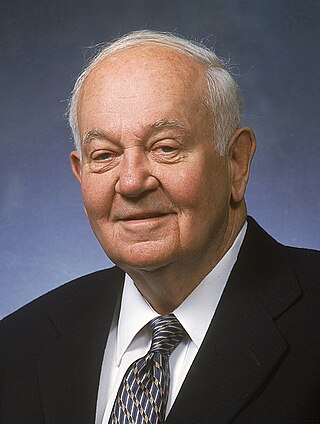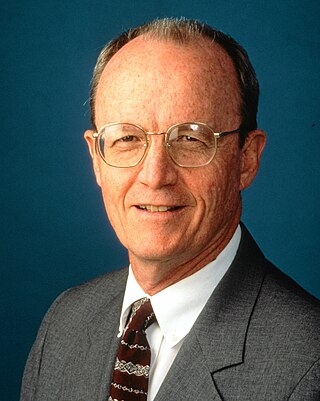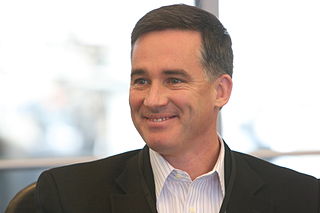Related Research Articles

Robert C. Michelson is an American engineer and academic who invented the entomopter, a biologically inspired flapping-winged aerial robot, and who established the International Aerial Robotics Competition. Michelson's career began at the U.S. Naval Research Laboratory. He later became a member of the research faculty at the Georgia Institute of Technology. He is the author of three U.S. patents and over 100 journal papers, book chapters and reports. Michelson is the recipient of the 1998 AUVSI Pioneer Award and the 2001 Pirelli Award for the diffusion of scientific culture as well as the first Top Pirelli Prize.
The Georgia Tech Research Institute (GTRI) is the nonprofit applied research arm of the Georgia Institute of Technology in Atlanta, Georgia, United States. GTRI employs around 3,000 people, and was involved in nearly $1 billion in research in 2023 for more than 200 clients in industry and government.
Joseph Mayo Pettit was an engineer who became dean of the Stanford University School of Engineering from 1958 to 1972, and president of the Georgia Institute of Technology from 1972 to 1986.
Fawwaz T. Ulaby is Arthur F. Thurnau Professor of Electrical Engineering and Computer Science at the University of Michigan in Ann Arbor and formerly the Founding Provost and Executive Vice President of the King Abdullah University of Science and Technology (KAUST) and R. Jamieson and Betty Williams Professor of Electrical Engineering and Computer Science at the University of Michigan.

Stephen Edward Cross is the executive vice president for research (EVPR) at the Georgia Institute of Technology (Georgia Tech), a position to which he was appointed in 2010. As EVPR, Cross coordinates research efforts among Georgia Tech's colleges, research units and faculty; and provides central administration for all research, economic development and related support units at Georgia Tech. This includes direct oversight of Georgia Tech's interdisciplinary research institutes, the Georgia Tech Research Institute (GTRI), the Enterprise Innovation Institute (EI2) and the Georgia Tech Research Corporation (GTRC).

Glen Parmelee Robinson, Jr., called the "father of high-tech industry in Georgia", was an American businessman and founder of Scientific Atlanta, now a subsidiary of Cisco Systems. Robinson was the first employee of Scientific Atlanta, where he remained CEO then Chairman of the company until he retired.

Tom McDermott is the Deputy Director of the Systems Engineering Research Center at Stevens Institute of Technology, a position he has held since March 2018.
Gisele Bennett was a professor at the Georgia Institute of Technology and the Director of the GTRI Electro-Optical Systems Laboratory at the Georgia Tech Research Institute (GTRI). She also founded the Logistics and Maintenance Applied Research Center (LandMARC) at GTRI.

Maurice W. Long was an American electrical engineer, radar engineer, and physicist. He served as director of the Georgia Tech Research Institute from 1968 to 1975. He worked as a part-time radar consultant, principal research engineer at GTRI and adjunct professor of electrical engineering at Southern Polytechnic State University.

Robert "Bob" T. McGrath is the director of RASEI, a joint institute of NREL and CU-Boulder. He was a senior vice president responsible for research partnership development in the office of the Executive Vice President for Research. He is also a former director of the Georgia Tech Research Institute, the applied research arm of Georgia Tech, a position he held from 2011 to 2014. Prior to his appointment as GTRI director, McGrath was involved with the Battelle Memorial Institute; his past experience also includes research leadership positions at the National Renewable Energy Lab, Ohio State University, and Penn State University.

Edward K. Reedy was the director of the Georgia Tech Research Institute (GTRI) from 1998 to 2003, and correspondingly a vice president of the Georgia Institute of Technology. He first joined GTRI in 1970, and specialized in radar system development and electromagnetic scattering. Reedy held a variety of research and leadership positions within the organization, including the head of Research Operations and four years as associate director.

William L. "Bill" Melvin is the deputy director of Sensors and Intelligent Systems at the Georgia Tech Research Institute. He is a former director of the GTRI Sensors and Electromagnetic Applications Laboratory (SEAL).
Rickey Bryan Cotton was a researcher in electromagnetism and radar-related fields at the Georgia Tech Research Institute's Sensors and Electromagnetic Applications Laboratory from 1980 until 2007.

Paul F. McManamon is an American scientist who is best known for his work in optics and photonics, as well as sensors, countermeasures, and directed energy.
George A. "Fred" Wright is an American engineer who is the Associate Laboratory Director and Principal Research Engineer of the Cyber Technology and Information Security Laboratory (CTISL) at the Georgia Tech Research Institute. In 2008, Wright founded a cyber security incubator, which led to the formation of CTISL in 2010. The Lab focuses on development and integration of security technologies into Government and industry enterprises. His research has focused in a variety of technical areas, including cyber security, electronic warfare, communications systems, signal processing, signals intelligence, and radar systems. Wright is also an adjunct professor of computer science at Georgia Institute of Technology.

Andrew Gerber is a retired Vice President at Raytheon Technologies.
Mark Andrew Richards is a retired American engineer best known for his textbooks and professional education courses in the area of radar and radar signal processing. He remains employed part time as a Principal Research Engineer and adjunct professor in the School of Electrical and Computer Engineering (ECE) at the Georgia Institute of Technology and as a private consultant and expert witness.
Fauzia Ahmad is an associate professor of electrical engineering at Temple University. Her research considers statistical signal processing and ultrasonic guided wave structural health monitoring. She serves as associate editor of the IEEE Transactions on Aerospace and Electronic Systems and Geoscience and Remote Sensing Society. She is a Fellow of the Institute of Electrical and Electronics Engineers and SPIE.

Douglas Henry Werner is an American scientist and engineer. He holds the John L. and Genevieve H. McCain Chair Professorship in the Penn State Department of Electrical Engineering and is the director of the Penn State University Computational Electromagnetics and Antennas Research Laboratory. Werner holds 20 patents and has over 1090 publications. He is the author/co-author of 8 books. According to Google Scholar, his h-index is 79 with more than 26,600 citations. He is internationally recognized for his expertise in electromagnetics, antenna design, optical metamaterials and metamaterial-enabled devices as well as for the development/application of inverse-design techniques.

Michael Theodore Eismann is an American scientist and researcher working at the Air Force Research Laboratory. He is a former editor of Optical Engineering and a member of the NATO Sensors and Electronics Technology panel. In 2023, Eismann was elevated to fellow membership of the IEEE.
References
- 1 2 "New Leadership: Melvin Tapped as Director of the Georgia Tech Research Institute's Sensors and Electromagnetic Applications Laboratory". Georgia Tech Research News. Georgia Institute of Technology. 2006-07-24. Retrieved 2011-11-08.
- 1 2 "Faculty/staff retirement dinner". The Whistle. Georgia Institute of Technology. 2005-06-05. Retrieved 2012-01-14.
- 1 2 "Dr. Robert N. Trebits". Southern Polytechnic State University . Retrieved 2012-01-14.
- ↑ "Robert N. Trebits". SPIE . Retrieved 2012-01-14.
- ↑ "Fellow Class of 1997". IEEE . Retrieved 2012-01-14.